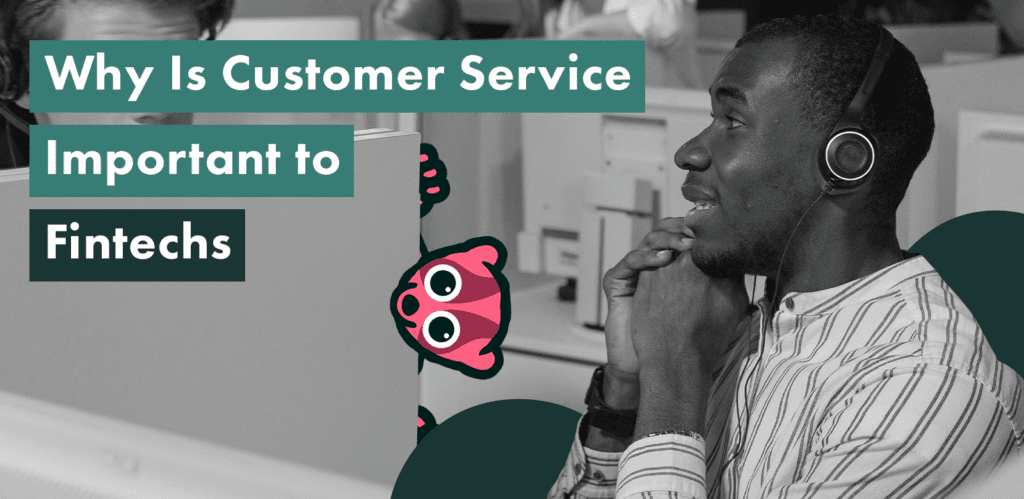
There are currently over 300,000 fintech companies in an industry worth over $226 billion.
With so much competition, it can be challenging for your fintech to stand out from the rest. One way you can differentiate yourself from your competitors is to provide excellent customer service.
It’s a well-known fact that more than 85% of customers are willing to pay more if they receive exceptional customer service. For this reason, you must provide good support to your clients.
In this article, we’ll guide you through why customer service is so important for fintech companies and provide some practical tips on how you can get it right.
Why Is Customer Service Important to Fintechs

There are several reasons why exceptional fintech customer service is crucial:
💰 You’re handling people’s money!
One of the nuances of fintech customer service is that you’re not just dealing with minor complaints about a product or service. You handle people’s hard earned money and their finances often depend on the speed and quality of the service you provide.
Even something as simple as a payment taking a day longer to process than it should may mean your customer falls behind on bills and has to face big consequences as a result of your poor service. Minor issues can cause customers a lot of stress, and they may lose faith in your company.
People are trusting you with their money, which means you need to provide them with the best support if you want them to continue to do business with you.
Handle your customers’ money diligently, and they’ll reward you. Just one instance of good customer service can turn 86% of customers into long-term brand champions.
💰 You don’t have a physical branch
Unlike banks or other traditional financial institutions, your app, website, and customer service department are the only points of contact your customers have with you. You don’t have a physical branch for them to visit or any other options for them to resolve their complaints.
Your customer service is a huge part of the customer experience with your product, so it needs to be superior. We’ll provide some tips later in this article on how you can provide customer service that exceeds customer expectations.
💡 A Word from Our Experts
“With most fintechs, there is no physical address or branch for people to go to with their problems. They can’t even visit an alternative branch if they’re not happy with the service at the initial one they visited. Your website, app, and customer service team are the entirety of the customer’s experience with your product. So, your customer service has to be almost perfect because they can’t go anywhere else.”
— Ciaran Doyle, Head of Marketing at Loris
💰 Complaints may be required by regulators
As a fintech, customer complaints you receive may need to be filed with regulators, such as the Consumer Financial Protection Bureau (CFPB) in the U.S.
If too many complaints are issued against you, then the regulator may investigate you, which could be detrimental to your reputation.
In fact, too many complaints could lead to an enforcement action or even order you to suspend your service entirely.
The solution here is to get ahead of issues so that you can prevent complaints from happening in the first place.
💰 Meeting customer expectations could be a differentiator
More than 89% of companies that have above-average customer service perform better financially than their competitors.
As mentioned earlier, you’re facing massive competition as a fintech. By providing your customers with excellent customer service, you boost satisfaction and set yourself apart from competitors.
In his Intercom podcast episode on how fintech companies are prioritizing great customer service, Liam Geraghty says, “In today’s competitive landscape, providing excellent customer service has become a critical differentiator for companies seeking to attract and retain customers.”
What Does Great Fintech Customer Service Consist Of?
Now that you know why good support is essential for fintech companies, let’s look at some customer service strategies to help you satisfy and retain your clients:
1. Omnichannel support
Over 35% of customers expect to be able to contact companies on any channel. Businesses with extremely strong omnichannel customer engagement retain 89% of their customers, compared to 33% for companies with weak omnichannel support.
Customers expect to be able to contact you via the channel that suits them best. For example, an elderly customer may be more likely to call your contact center, while a Gen Z customer may want to instant message you.
2. Self-service tools
Most customers prefer to solve their problems on their own without having to speak to a support agent. In fact, more than 88% of customers expect brands to have an online self-service portal.
Effective self-service support means you help customers overcome their issues themselves. This saves them time and effort, resulting in higher levels of satisfaction.
Providing self-service options also means your contact center will likely receive fewer complaints, which means you won’t have to file as many issues with regulators.
3. Rapid response times
Around 90% of customers view an instant response to their complaints and inquiries as very important when they need customer service assistance.
Almost 46% of customers expect companies to respond faster than four hours, and 12% expect a response within 15 minutes or less.
Delays in handling customer complaints and inquiries could lead to:
❌ Delayed payments.
❌ Customers losing their money.
❌ Causing customers financial or emotional stress.
You must reduce wait times and ensure you can resolve complaints as quickly as possible when they contact your support center.
4. Consistency
The service you provide should be of the same level across all your support channels, including calls, emails, and live chats.
70% of customers say that service agents’ awareness of all their interactions is fundamental to retaining their business.
For example, if a customer contacts you via live chat today, the information they provide should be recorded so that if they contact you again via telephone tomorrow, the agent has access to it. This ensures customers don’t have to repeat their problems to multiple agents and improves their experience with your support team.
5. Personalization
More than 70% of customers expect personalized interactions with a company.
One of the main problems fintech companies face when providing good customer service is retaining the element of the ‘human touch’. Even if you are providing self-service solutions and automated customer service through bots, you still need to personalize your interactions.
You can personalize your interactions by:
✅ Using the customer’s name.
✅ Speaking in a tone of voice that matches their sentiment.
✅ Showing empathy and apologizing if it’s warranted.
✅ Ensuring you pinpoint the root cause of their issue and develop solutions to resolve or at least provide an explanation about the issue in a way that the customer feels heard.
6. Emphasis on data
Data is the driving force behind good customer service in fintech. The data you receive from customer conversations and your call center software can be beneficial to your business if you can properly structure and analyze it. If used wisely, it allows you to make continuous improvements to ensure your customers have the best experience.
For example, if your data reveals that customers are contacting you to complain about a certain product feature, your product development team knows they need to make this feature easier to use or remove it completely.
Having high-level issues and specific customer conversations can help you both prioritize what needs to be done and give you their perspective on why the feature isn’t intuitive enough or working as expected.
Too many businesses try to use incomplete data to make improvements. This is because traditional customer service approaches like customer surveys and random conversation reviews only give you a sample of your customer population to analyze. This data is often biased and inaccurate, leading down a path that wastes valuable effort and time.
Additionally, it’s unrealistic for humans to interpret large sets of data and spot patterns and derive insights themselves. It would be difficult for your quality assurance (QA) analysts and contact center managers to sift through thousands of interactions manually and find meaningful insights.
The solution is to get actionable insights from a conversation intelligence platform like Loris. Loris analyzes every customer interaction to find patterns and trends that wouldn’t be obvious if you had to analyze your data yourself.
If you have all the data from every customer service interaction your contact center receives, you can start improving your customer experience, products, and customer service.
Like what you’re reading? Get the latest news and product updates delivered to you in our newsletter.
Top Fintech Customer Support Challenges

There are several challenges that many fintech companies face when providing customer service:
➡️ Account security concerns
As you’re dealing with people’s money, you would need to have strong security measures in place to protect their funds. Solid security measures include having two-factor authentication or biometrics in place, for example.
Let’s say a customer notices suspicious activity on their account despite your security best practices. You need to make it super easy for them to alert your support team or lock down their accounts.
Acting quickly and resolving these issues quickly can reduce the chance of customers losing their money to illicit activity and give you an opportunity to provide excellent customer service. Similarly, if a customer is blocked from getting into their account unecessarily, they need a way to confirm their identity and complete their transactions easily.
Finally, you need to educate your customers on how they can protect their accounts to avoid these issues completely. For example, understanding the importance of a strong password and how to create one can help them avoid fraud.
➡️ Complex transactions
Customers may encounter difficulties using your product for more complex transactions as well as understanding the differences between financial products and plans. To mitigate this, you can provide how-to guides and tutorials on your app or website to help customers carry out these processes.
It should also be simple for your customers to speak to an agent who can walk them through the process step-by-step.
➡️ Disputed transactions
You should provide clear and straightforward processes for customers to dispute unauthorized transactions on their accounts.
Your support team needs to offer quick response times, initiate investigations promptly, and keep customers informed throughout the dispute resolution process.
You should also consider offering a user-friendly feature for submitting dispute claims and uploading evidence to enhance the customer experience.
➡️ Downtime and technical glitches
As your product is an app or website, there will be downtime and technical glitches from time to time. However, even a few minutes of downtime can cost your customers money.
You need to monitor your systems closely, for example using website monitoring rools, to minimize downtime and quickly address any technical issues. You should also communicate proactively with your customers to keep them informed.
For example, you could send real time notifications about the status of your issue, estimated resolution times, and temporary workarounds that can help mitigate customer frustration.
➡️ Account closure or migration assistance
Give clients clear guidance on how to close their accounts and migrate to a different business.
Offering chat, email, or phone support for customers going through this process is crucial. You should be able to talk them through it and address any concerns they may have.
At this point, it’s also important to collect feedback from customers who have decided to leave your business to understand their reasons for doing so and make improvements for the future.
How AI and Automation Can Boost Your Fintech
As mentioned earlier, to get accurate data and actionable insights, you need to collect data from every support channel and customer interaction in your contact center. Manually collecting this data and deriving meaningful insights would be endless work.
A conversational intelligence platform like Loris can collect and analyze all your customer interactions without you needing to do any manual work.
With Loris, fintech companies can:
✅ Measure customer experience at the agent, team, and organizational level.
✅ Understand what customers need and provide actionable insights to improve both products and customer journeys.
✅ Demonstrate the performance of your customer service team and uncover trends easily and quickly.
✅ Give teams across your company the fast feedback and guidance they need to make improvements and address complaints.
Visit our website to speak to an expert today. We’d love to tell you more about how Loris can help your fintech provide your customers with a seamless customer experience.
